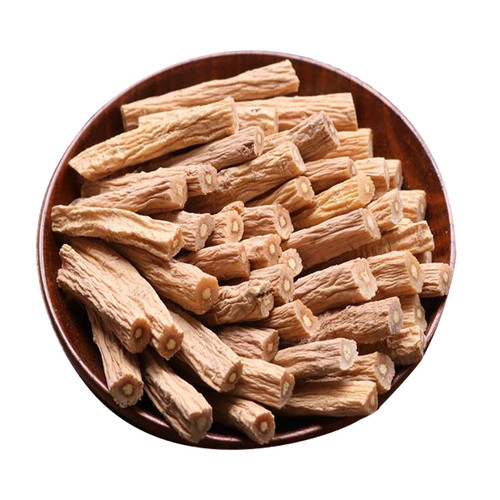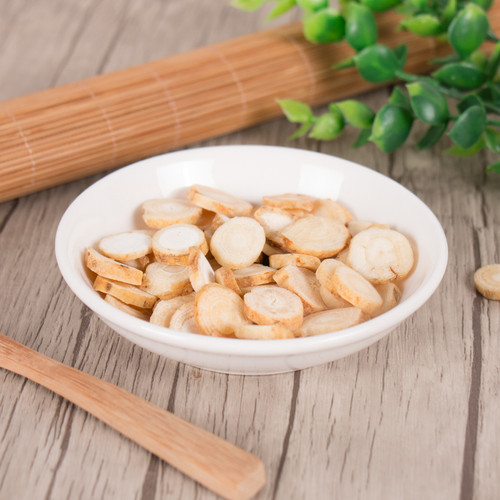Product Overview
Parts used: Dried root
TCM category: Tonic herbs for Qi Deficiency
TCM nature: Neutral
TCM taste(s): Sweet
Meridian affinity: Spleen Lung
Scientific name: Codonopsis pilosula or Codonopsis tangshen
Use of codonopsis roots (Dang Shen) in TCM
Please note that you should never self-prescribe TCM ingredients. A TCM ingredient is almost never eaten on its own but as part of a formula containing several ingredients that act together. Please consult a professional TCM practitionner, they will be best able to guide you.
Preparation: Remove the smaller fibrous roots and wash, slice and dry.
Dosage: 9 - 30 grams
Main actions according to TCM*: Tonifies the Spleen and Lung Qi. Assists in the secretion of Bodily Fluids.
Primary conditions or symptoms for which codonopsis roots may be prescribed by TCM doctors*: Loss of appetite Palpitations Diarrhea Fatigue Whooping cough
Contraindications*: This herb should be used with caution when there is acute illness.
Common TCM formulas in which codonopsis roots are used*:
For Cold type dysentery and diarrhea caused by Deficient Spleen Qi combine codonopsis roots with nutmeg (Rou Dou Kou) and atractylodes rhizomes (Bai Shu).
For insomnia caused by Spleen Qi and Heart Blood Deficiency combine codonopsis roots with jujube seeds (Suan Zao Ren) and poria-cocos mushrooms (Fu Ling).
For symptoms of abdominal pain, nausea and vomiting combine codonopsis roots with sharp-leaf galangal fruits (Yi Zhi Ren), atractylodes rhizomes (Bai Shu) and dried ginger (Gan Jiang).
For diarrhea and excessive salivation or drooling caused by Spleen Deficiency combine codonopsis roots with sharp-leaf galangal fruits (Yi Zhi Ren), poria-cocos mushrooms (Fu Ling), crow-dipper rhizomes (Ban Xia) and dried ginger (Gan Jiang).
For the treatment of prolapsed Qi with symptoms of chronic fatigue and weakness as a result of physical exertion or stress combine codonopsis roots with bupleurum roots (Chai Hu), atractylodes rhizomes (Bai Shu), milkvetch roots (Huang Qi), ginseng (Ren Shen), liquorice (Gan Cao), dong quai (Dang Gui), bugbane rhizomes (Sheng Ma) and tangerine peel (Chen Pi).
For asthma, cough combine codonopsis roots with lingzhi mushroom (Ling Zhi), schisandra berries (Wu Wei Zi), prepared aconite (Zhi Fu Zi) and crow-dipper rhizomes (Ban Xia).
For Qi and Yin deficiency with stifling sensation in the chest combine codonopsis roots with angular solomon's seal roots (Yu Zhu).
For Spleen Qi deficiency combine codonopsis roots with king solomon's seal roots (Huang Jing) and atractylodes rhizomes (Bai Shu).
For Spleen deficiency with lack of appetite and fatigue combine codonopsis roots with atractylodes rhizomes (Bai Shu) and malt (Mai Ya).
For Yang and Qi deficiency with spontaneous sweating combine codonopsis roots with cornelian cherries (Shan Zhu Yu) and milkvetch roots (Huang Qi).
For Spleen deficiency with chronic diarrhea combine codonopsis roots with cherokee rose fruits (Jin Ying Zi), atractylodes rhizomes (Bai Shu) and yam (Shan Yao).
For chronic diarrhea due to Spleen Yang deficiency combine codonopsis roots with pomegranate peel (Shi Liu Pi), atractylodes rhizomes (Bai Shu) and poria-cocos mushrooms (Fu Ling).
Key TCM concepts behind codonopsis roots (Dang Shen)'s properties
In Traditional Chinese Medicine (TCM), codonopsis roots are plants that belong to the 'Tonic herbs for Qi Deficiency' category. Tonic herbs are used for patterns of Deficiency, when one lacks one of the 'Four Treasures' (Qi, Blood, Yin and Yang). Qi tonics are typically sweet and they tend to enter the Spleen and Lungs because these organs are most involved with the production of Qi.
Furthermore codonopsis roots are plants that are Neutral in nature. This means that codonopsis roots typically don't affect the balance in your body. Balance between Yin and Yang is a key health concept in TCM. Eating too many "Hot" (Yang) ingredients can lead to an imbalance whereby one has a Yang excess. The inverse is true as well: too many "Cold" (Yin) ingredients can lead to a Yin excess. The Neutral nature of codonopsis roots means that you don't have to worry about that!
Codonopsis roots also taste Sweet. The so-called "five elements" theory in Chinese Medicine states that the taste of TCM ingredients is a key determinant of their action in the body. Sweet ingredients like codonopsis roots tend to slow down acute reactions and detoxify the body. They also have a tonic effect because they replenish Qi and Blood.
The tastes of ingredients in TCM also determine what organs and meridians they target. As such codonopsis roots are thought to target the Spleen and the Lung. In TCM the Spleen assists with digestion, blood coagulation and fluid metabolism in the body. In addition to performing respiration, the Lungs are thought to be a key part of the production chain for Qi and the body fluids that nourish the body.









